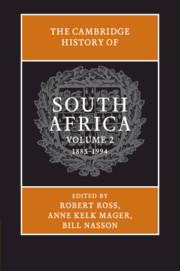Book contents
- Frontmatter
- Contents
- Contributors
- Acknowledgments
- Note on references
- Introduction
- 1 South Africa and South Africans: Nationality, Belonging, Citizenship
- 2 Imperialism, Settler Identities, and Colonial Capitalism: The Hundred-Year Origins of the 1899 South African War
- 3 Class, Culture, and Consciousness in South Africa, 1880–1899
- 4 War and Union, 1899–1910
- 5 South Africa: The Union Years, 1910–1948 – Political and Economic Foundations
- 6 South African Society and Culture, 1910–1948
- 7 The Apartheid Project, 1948–1970
- 8 Popular Responses to Apartheid: 1948–c. 1975
- 9 Resistance and Reform, 1973–1994
- 10 The Evolution of the South African Population in the Twentieth Century
- 11 The Economy and Poverty in the Twentieth Century
- 12 Modernity, Culture, and Nation
- 13 Environment, Heritage, Resistance, and Health: Newer Historiographical Directions
- Statistical Appendix
- Bibliography
- Index
13 - Environment, Heritage, Resistance, and Health: Newer Historiographical Directions
Published online by Cambridge University Press: 28 July 2011
- Frontmatter
- Contents
- Contributors
- Acknowledgments
- Note on references
- Introduction
- 1 South Africa and South Africans: Nationality, Belonging, Citizenship
- 2 Imperialism, Settler Identities, and Colonial Capitalism: The Hundred-Year Origins of the 1899 South African War
- 3 Class, Culture, and Consciousness in South Africa, 1880–1899
- 4 War and Union, 1899–1910
- 5 South Africa: The Union Years, 1910–1948 – Political and Economic Foundations
- 6 South African Society and Culture, 1910–1948
- 7 The Apartheid Project, 1948–1970
- 8 Popular Responses to Apartheid: 1948–c. 1975
- 9 Resistance and Reform, 1973–1994
- 10 The Evolution of the South African Population in the Twentieth Century
- 11 The Economy and Poverty in the Twentieth Century
- 12 Modernity, Culture, and Nation
- 13 Environment, Heritage, Resistance, and Health: Newer Historiographical Directions
- Statistical Appendix
- Bibliography
- Index
Summary
Through its preceding chapters, this book has sought to provide not only a sustained account of modern South Africa's historical development but also, as its contributors stress at various points, a conscious reflection of what has been a particularly fertile brand of national historiography. Naturally, the rethinking of approaches to the understanding of both pre-1994 and post-1994 South African society continues, and in this initial postapartheid phase, scholars have been inserting new explanatory perspectives or empirical information into a complex story. As the introduction to the volume has emphasised, more recent stories remain to be told. Equally, there are older or more established stories that may have been told but that can bear retelling through fresh analytical perspectives or on the basis of categories of evidence previously neglected or unavailable. Thus, in this concise concluding chapter, we consider four significant thematic areas with which South Africa's historians have been engaging particularly since the 1990s. These are the issues of the environment, of heritage and history, of later anti-apartheid resistance – or what has also come to be known as struggle history – and the history of health.
- Type
- Chapter
- Information
- The Cambridge History of South Africa , pp. 600 - 624Publisher: Cambridge University PressPrint publication year: 2011



